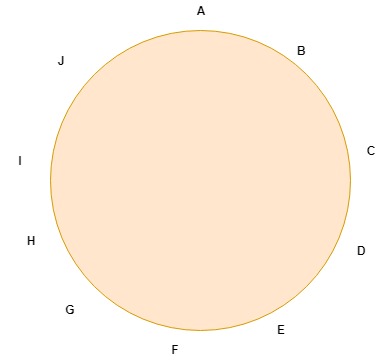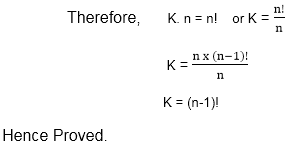Permutation:
Any arrangement of a set of n objects in a given order is called Permutation of Object. Any arrangement of any r ≤ n of these objects in a given order is called an r-permutation or a permutation of n object taken r at a time.
It is denoted by P (n, r)
P (n, r) =
Theorem: Prove that the number of permutations of n things taken all at a time is n!.
Proof: We know that

Example: 4 x np3=n+1P3
Solution: 4 x 

4 (n-2) = (n+1)
4n – 8 = n+1
3n = 9
n = 3.
Permutation with Restrictions:
The number of permutations of n different objects taken r at a time in which p particular objects do not occur is

The number of permutations of n different objects taken r at a time in which p particular objects are present is

Example: How many 6-digit numbers can be formed by using the digits 0, 1, 2, 3, 4, 5, 6, 7, 8 if every number is to start with ’30’ with no digit repeated?
Solution: All the numbers begin with ’30.’So, we have to choose 4-digits from the remaining 7-digits.
∴ Total number of numbers that begins with ’30’ is
7P4 =  =840.
=840.
Permutations with Repeated Objects:
Theorem: Prove that the number of different permutations of n distinct objects taken at a time when every object is allowed to repeat any number of times is given by nr.
Proof: Assume that with n objects we have to fill r place when repetition of the object is allowed.
Therefore, the number of ways of filling the first place is = n
The number of ways of filling the second place = n
………………………..
………………………..
The number of ways of filling the rth place = n
Thus, the total number of ways of filling r places with n elements is
= n. n. n…………..r times =nr.
Circular Permutations:
A permutation which is done around a circle is called Circular Permutation.

Example: In how many ways can get these letters a, b, c, d, e, f, g, h, i, j arranged in a circle?
Solution: (10 – 1) = 9! = 362880
Theorem: Prove that the number of circular permutations of n different objects is (n-1)!
Proof: Let us consider that K be the number of permutations required.
For each such circular permutations of K, there are n corresponding linear permutations. As shown earlier, we start from every object of n object in the circular permutations. Thus, for K circular permutations, we have K…n linear permutations.

Combination:
A Combination is a selection of some or all, objects from a set of given objects, where the order of the objects does not matter. The number of combinations of n objects, taken r at a time represented by nCr or C (n, r).

Proof: The number of permutations of n different things, taken r at a time is given by

As there is no matter about the order of arrangement of the objects, therefore, to every combination of r things, there are r! arrangements i.e.,

Example: A farmer purchased 3 cows, 2 pigs, and 4 hens from a man who has 6 cows, 5 pigs, and 8 hens. Find the number m of choices that the farmer has.
The farmer can choose the cows in C (6, 3) ways, the pigs in C (5, 2) ways, and the hens in C (8, 4) ways. Thus the number m of choices follows:

Leave a Reply